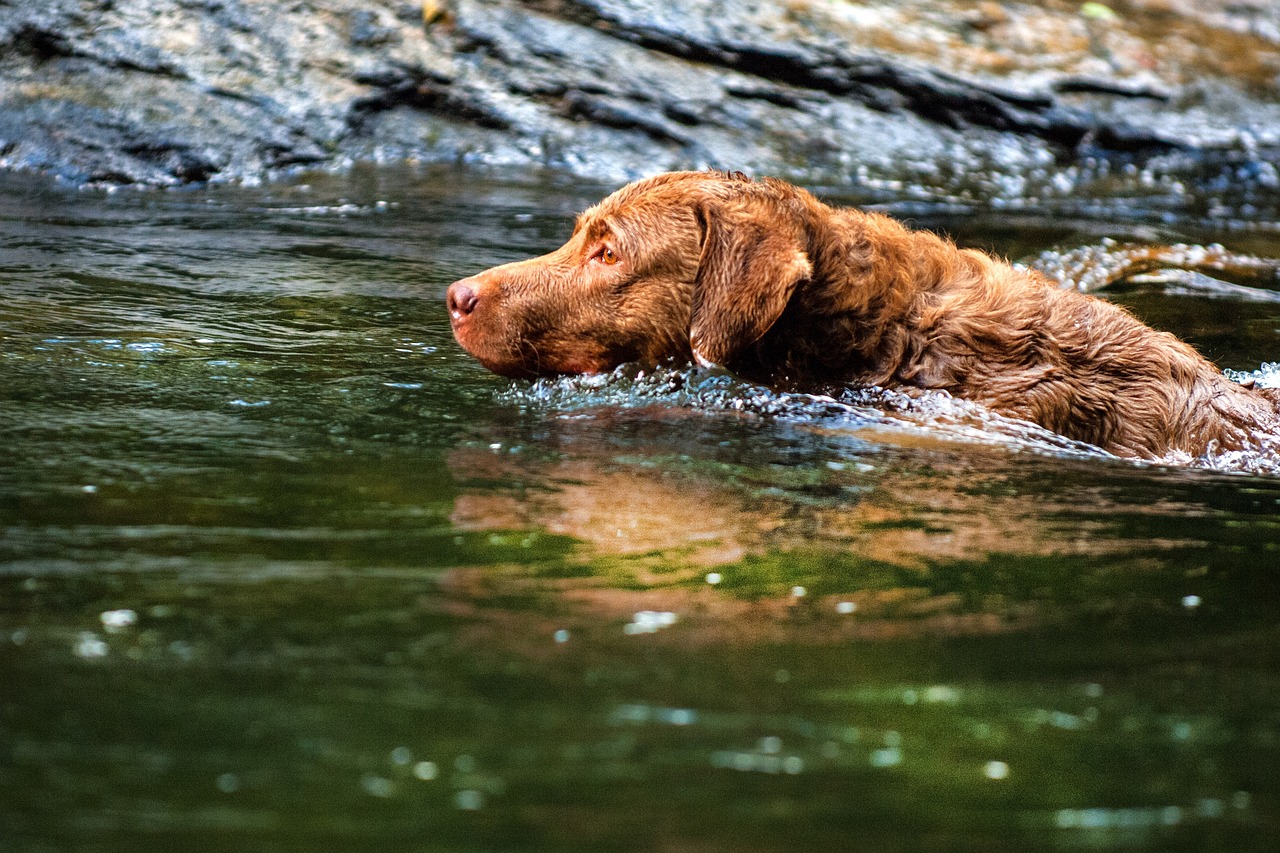Chesapeake Bay Retrievers, often referred to as Chessies, are a robust and resilient breed known for their love of water and strong retrieving skills. Originating from the Chesapeake Bay area in the United States, they are bred for hunting and retrieving in harsh weather conditions, including icy waters. As winter approaches, many Chessie owners may wonder how their pets will handle the colder climate. This detailed article explores the adaptability of Chesapeake Bay Retrievers to cold weather and provides essential care tips for the winter months.
Chesapeake Bay Retrievers and Their Winter Coat
Chesapeake Bay Retrievers are equipped with a dense double coat that provides excellent insulation against cold weather. Their outer coat is harsh and oily, which repels water, while the undercoat is wooly and dense, retaining heat. This unique coat makes them particularly well-suited to colder, wet conditions.
Cold Weather Adaptability of Chessies
Chessies are highly adaptable to cold weather due to their coat’s insulating properties and their historical breeding for hunting in rough, cold waters. They are more tolerant of cold temperatures compared to many other breeds, making them excellent companions for outdoor activities in winter.
Recognizing Chessie’s Limit in Cold Weather
Despite their natural resilience to cold, Chessies can still be affected by extreme temperatures. Prolonged exposure to severe cold without adequate shelter or rest can be harmful. Owners should look for signs of discomfort, such as shivering or reluctance to engage in activities they usually enjoy.
Ensuring Adequate Shelter and Warmth
While Chessies are capable of handling cold weather, providing them with a warm and comfortable shelter is essential. Indoors, they should have a cozy place to rest, away from drafts. Outdoor kennels should be insulated and protected from wind and moisture.
Balancing Exercise and Exposure in Winter
Exercise is crucial for maintaining a Chessie’s health, but during winter, it’s important to balance it with safety. Outdoor activities should be adjusted according to weather conditions, ensuring that your dog isn’t overexposed to harsh elements.
Nutritional Needs During Colder Months
In winter, Chesapeake Bay Retrievers may require a slight increase in their calorie intake, especially if they are active outdoors. This helps them maintain energy levels and body heat. However, it’s important to monitor their diet closely to prevent obesity.
Importance of Grooming in Cold Weather
Regular grooming is essential to maintain the insulating properties of a Chessie’s coat. This includes brushing to remove dead fur and mats, and occasional baths with a dog-specific shampoo to maintain the coat’s natural oils, which are crucial for water resistance and insulation.
Indoor Comfort for Chessies During Winter
Creating a comfortable indoor environment for Chessies during winter is important for their well-being. This includes maintaining a warm indoor temperature and providing a dry, comfortable bed for them to rest and recover from the cold.
Understanding Behavioral Changes in Cold Weather
Owners might notice changes in their Chessie’s behavior during colder months. Some may become more energetic and playful, enjoying the cooler temperatures, while others might prefer staying indoors more. Recognizing and accommodating these changes is key to their overall comfort and happiness.
Conclusion: Caring for Your Chesapeake Bay Retriever in Cold Weather
Chesapeake Bay Retrievers are generally well-equipped to handle cold weather, but they still require thoughtful care and attention during the winter months. By understanding their needs, providing appropriate shelter, and monitoring their diet, exercise, and grooming, owners can ensure that their Chessies stay comfortable and healthy throughout the colder season.
Frequently Asked Questions About Chesapeake Bay Retrievers and the Climates They Thrive In
1. How Well Do Chesapeake Bay Retrievers Tolerate Cold Weather?
Chesapeake Bay Retrievers are exceptionally well-suited to cold weather, thanks to their dense, waterproof double coat. Originally bred for retrieving in the icy waters of Chesapeake Bay, they have a natural resilience to cold and wet conditions. However, they should still have access to warm, dry shelter, especially in extreme cold or when they are not active.
2. Can Chesapeake Bay Retrievers Live Comfortably in Snowy Climates?
Chesapeake Bay Retrievers can live comfortably in snowy climates. Their thick coat provides excellent insulation against the cold, and they often enjoy playing in the snow. Owners should ensure they have a warm place to retreat to and monitor their paws for ice buildup or sensitivity to deicing salts.
3. Do Chesapeake Bay Retrievers Need Winter Clothing?
While Chesapeake Bay Retrievers have a coat that protects them against the cold, in extremely harsh winter conditions, additional clothing like jackets can provide extra warmth. This is particularly beneficial for older dogs or those with health concerns that may make them more susceptible to the cold.
4. Are Chesapeake Bay Retrievers Prone to Cold Weather Health Issues?
Chesapeake Bay Retrievers are not particularly prone to cold weather health issues due to their robust nature and protective coat. However, they should not be left outside for extended periods in freezing temperatures, as this can lead to risks like hypothermia or frostbite.
5. What is the Ideal Indoor Temperature for Chesapeake Bay Retrievers in Winter?
The ideal indoor temperature for Chesapeake Bay Retrievers in winter is a comfortable and moderate range, around 68-72°F (20-22°C). While they are adapted to cold weather, a warm indoor environment is beneficial for their rest and recovery.
6. How Should Chesapeake Bay Retrievers Be Exercised in Cold Weather?
Chesapeake Bay Retrievers should continue to receive regular exercise in cold weather, but precautions should be taken in extreme conditions. Shorter, more frequent walks and play sessions are advisable, and owners should watch for signs of discomfort or reluctance to be outside in the cold.
7. How Do Chesapeake Bay Retrievers Behave in Cold Weather?
In cold weather, Chesapeake Bay Retrievers may become more energetic and playful, especially in the snow. However, every dog is an individual, and some may prefer staying indoors more during the winter. Owners should observe their dog’s behavior and preferences and adjust their care accordingly.
8. Should Chesapeake Bay Retrievers Sleep Outdoors in Winter?
No, Chesapeake Bay Retrievers should not sleep outdoors in winter. Despite their thick coat, they need a warm, dry place to sleep inside to protect them from the cold and ensure their well-being.
9. Can Chesapeake Bay Retrievers Adapt to Different Climates?
Chesapeake Bay Retrievers are versatile and can adapt to various climates, including both cold and moderate conditions. However, in hotter climates, they require access to shade, water, and air conditioning to prevent overheating.
10. Are Chesapeake Bay Retrievers Good for Allergy Sufferers in Different Climates?
Chesapeake Bay Retrievers are not considered hypoallergenic and they do shed, especially during seasonal changes. Their suitability for allergy sufferers can vary, and regular grooming can help manage shedding and allergens in the home.





